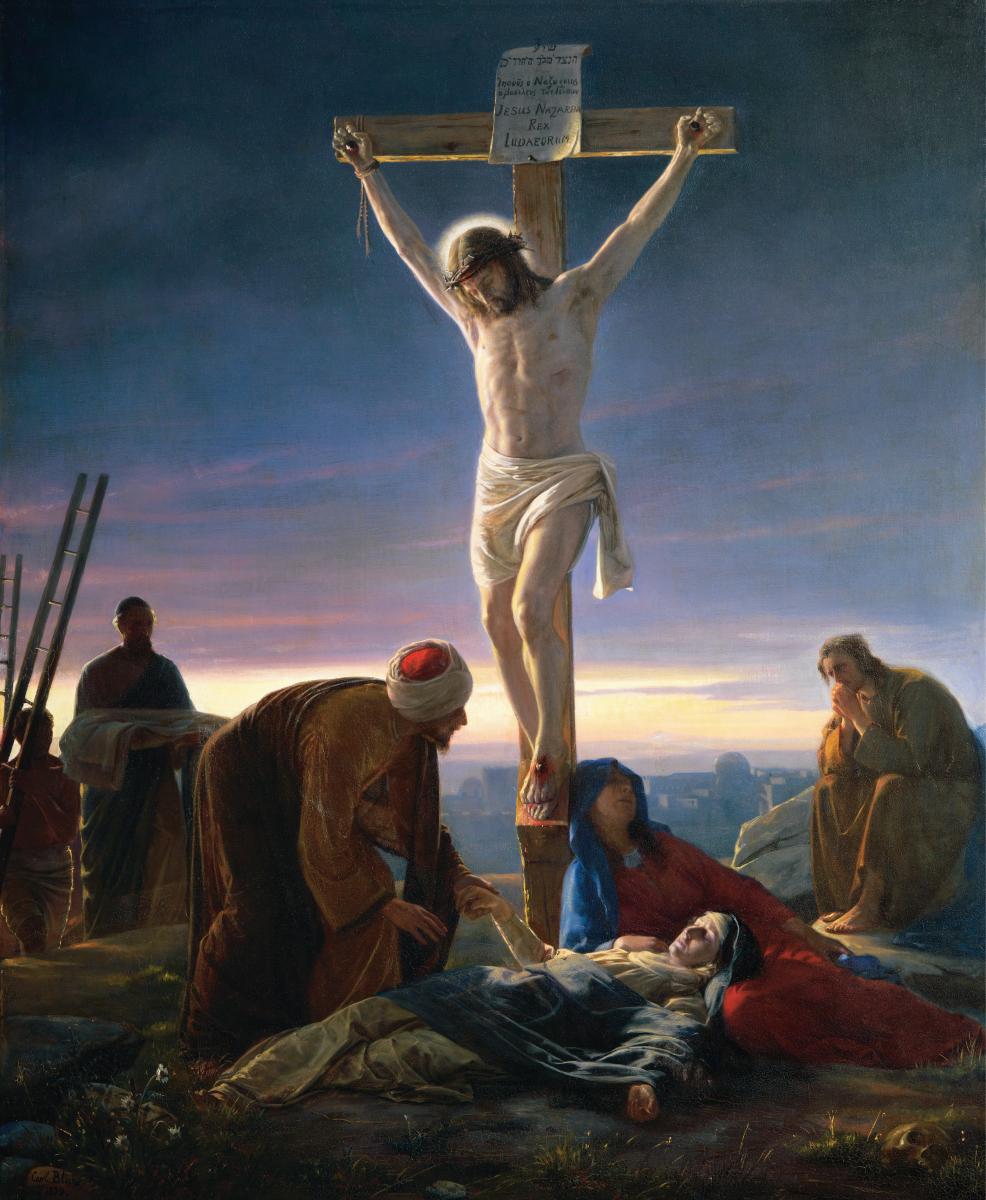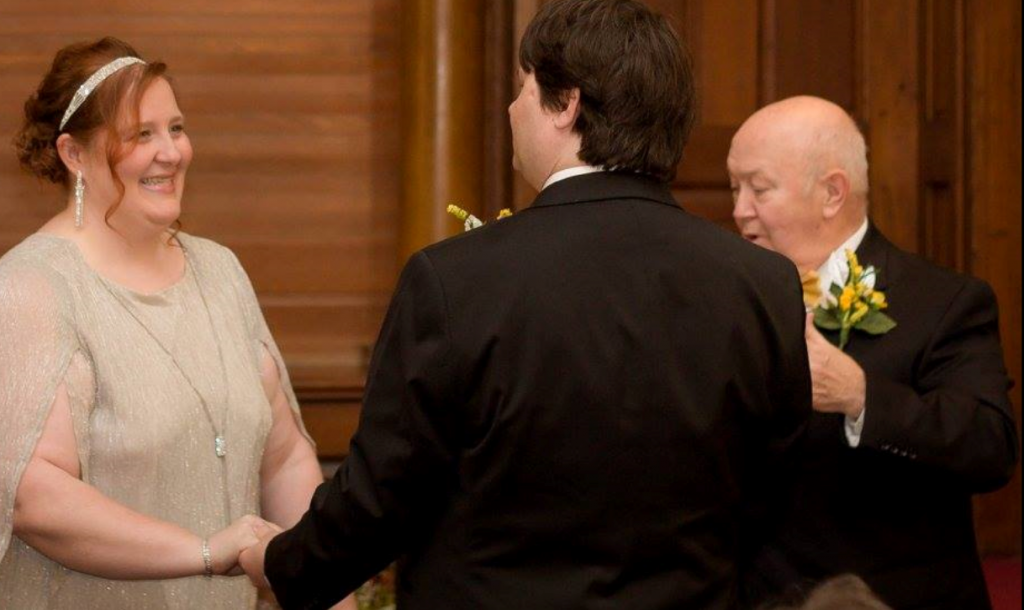Dear Brothers and Sisters,

On Good Friday, many Christians will ponder a statement spoken by Jesus as he hung dying on the cross:
My God, my God, why have you forsaken me? (Matthew 27:46)
Search the internet and you’ll find multiple explanations for why Jesus spoke these words (quoting Psalm 22:1). A common one is that he made this anguished cry knowing that his heavenly Father, being holy, had turned away from him as the sins of the world were placed upon him. The problem with this explanation is that it posits a separation in the Holy Trinity. Did the Trinity break at the cross?

(public domain via Wikimedia Commons)
As we think about this issue, we must first remember that the doctrine of the Trinity declares that there is one God who exists eternally as three distinct Persons: Father, Son and Holy Spirit. Our Trinitarian faith is based on this doctrine. A key word is eternally—had there been a separation (even momentarily) between the Father and Son at the cross, eternally would no longer apply. But it does, and therefore the Trinity cannot have been broken. Here are some of the reasons for this conclusion:
- Perichoresis. Early church teachers used the Greek word perichoresis to describe God’s inseparable, tri-personal nature. The word makes clear that God is not composed of detachable parts. The three Persons of the Trinity are one—meaning that the Father, Son and Spirit mutually indwell (coinhere) one another from eternity. This unique relationship of the Triune Persons was revealed by Jesus to his apostles who, in turn, told us. Were God not Father, Son and Spirit in this way for all eternity the Father would not be the Father nor God, the Son would not be the Son nor God, and the Holy Spirit would not be the Holy Spirit nor God. God has no other way of being God except by being Triune. The only God that was, is and will be is the one Triune God.
- God’s omnipresence. Scripture teaches there is no place where God is not present. It also teaches God is three Persons who coinhere—they are inseparable, and thus everywhere present together. That being so, God’s omnipresence calls into question how any sort of divine abandonment could have occurred, particularly considering that the “fullness” of the Godhead dwelt in Jesus (Col. 2:9).
- God’s omniscience. Scripture also teaches that there is nothing God has not known, seen or anticipated and has intended a providential response to. God knows the beginning from the end. At the moment he spoke everything into existence, he knew every sin that would ever be committed, and the remedy for it. If we take the metaphor that God cannot “look upon” sin in an absolute way, meaning not have any awareness of or have absolutely nothing to do with sin, then how did he know that humanity would continue to sin and send prophets to Israel with a warning message? If God cannot look upon sin, how could he ever deal with sin in any real way? To say that God could not look upon that which he already knew would occur, is nonsensical. The metaphor, taken from Hab. 1:3, simply means God does not in any way approve of sin and evil.
- The whole God is Savior. Jesus declares in John 17:21 that he is in the Father and the Father is in him. Jesus was describing a unique, permanent reality that tells us who he is. That’s why Scripture declares Jesus to be Immanuel (God with us). It’s also why the New Testament tells us that the whole God (Father, Son and Spirit) is our Savior, not just Jesus, or just the Father or the Holy Spirit.
- The teachings of the early church. That the idea of a breaking apart of the Trinity is unbiblical is attested by multiple leaders and teachers in the early church, and later, including Athanasius, Cyril of Alexandria, John of Damascus, Peter Abelard and Thomas Aquinas. Why? Because when they read all of Psalm 22 (which Jesus was quoting), they found unity and harmony between the Father and the Son, not separation and alienation.
- Jesus’ other statements on the cross. The other statements spoken by Jesus on the cross do not support the idea of a God-forsaken Son. In dialogue with his Father, Jesus says the following: “Father forgive them for they do not know what they are doing” (Luke 23:34); “It is finished” (John 19:30); and “Father, into your hands I commit my spirit” (Luke 23:46). Note also Peter’s comment on Pentecost, giving voice to Jesus addressing his Father: “You will not abandon my soul to Hades, or let your Holy One see corruption” (Acts 2:27 ESV, making reference to Psalm 16:10 ESV). God is not defiled by sin, nor is he afraid to look on sin, even the sin of the whole world borne by his Son on the cross.
- Jesus, who is not separate from sinners, is God. Jesus, who is fully God and fully human, dwelt on earth in the midst of sinful humanity in order to deal with evil and death. He touched lepers and raised the dead. He identified sin wherever he encountered it and warned against it. He fought temptation to sin directed at him from the source of sin itself, Satan. He experienced for us the temporal wages of sin, which is human death. Jesus did all this as the eternal Son of God incarnate. God, revealed to us in Jesus, does not separate himself from sin and evil. Instead, the incarnate Son of God came right into it, taking it upon himself, and thus bringing healing to sin-sick humanity.
- God is not defiled by our sin. Had our sin defiled God, Jesus could not have been our perfect sacrifice, because as Paul explained in 2 Corinthians 5:21, Jesus, who “had no sin,” was, by God, made “sin for us.” This does not mean that Jesus became sinful (a sinner). Rather, it means he became a sin offering for us just as the Azazel goat was on the Day of Atonement as the representative of Israel’s sin. Note this in Isaiah 53:10 (ESV):
Yet it was the will of the Lord to crush him;
he has put him to grief;
when his soul makes an offering [‘asam] for guilt,
he shall see his offspring; he shall prolong his days;
the will of the Lord shall prosper in his hand.
Jesus did not become a sinner stained with impurity or immorality. Instead, by assuming our sinful nature and condition, and then sanctifying that nature in himself (ultimately on the cross), Jesus became the innocent, unblemished sin offering on our behalf, thereby reconciling us to God. The notion of an absolute separation of God the Father from Jesus the Son falls far short of the biblical facts.
God was not taking his wrath out on Jesus
The theory that God’s separation from sin included pouring out his wrath on his Son is another wrong-headed idea that is not biblically defensible. The truth of the gospel is that the Father was not punishing the Son, as if the Father opposed the Son, was at odds with him, or willed at that moment that the Son’s end would be the same as the end of sin and evil itself. God is not guilty of child abuse, as some who reject the cross of Christ altogether claim. That charge is based on a false inference that the church has never taught (even by those upholding a separation theory).
The idea that the Father took out his wrath on his Son is preposterous. It ignores the biblical facts that the Son was not forced by the Father to die, but that Jesus voluntarily laid down his life and took it up again (John 10:18; Hebrews 7:26). The Father and the Son (with the Spirit) are one in will and mind to do whatever it would take to rescue humanity from sin and the power of evil. The Son was no victim of a tragedy. You would expect no less from the tri-personal God who is eternally one in being.
The author of Hebrews contrasts animal sacrifices with the triune activity involved in bringing about our redemption: “How much more will the blood of Christ, who through the eternal Spirit offered himself without blemish to God, purify our conscience from dead works to worship the living God” (Heb. 9:14). Note here that it is the whole Triune God (Father, Son and Spirit) who accomplishes our salvation. And within God’s triune nature, love and anger (wrath) are not at odds. Because God loves us, he is against all that is against us. Were God were not opposed to sin and evil he would not be loving towards us. God separates us from our sin, rescuing us, and condemning the sin and the power of sin. This he has done in the “flesh”—the human nature of the Son of God incarnate:
God has done what the law, weakened by the flesh, could not do. By sending his own Son in the likeness of sinful flesh and for sin, he condemned sin in the flesh… (Rom. 8:3 ESV)
It is not just the Father who is angry against sin. The Father and the Son are equally committed to our redemption and thus to the final judgment that condemns all evil. The whole triune God hates sin for what it does to his creation, yet he loves the sinner for whom Jesus died. The apostle Paul taught that “God was in Christ, reconciling the world unto himself” (2 Corinthians 5:19 ASV). The Father, Son and Spirit deal with our sin in the incarnate Son, regenerating our fallen nature in him (Titus 3:5) so that we might share in his new humanity by the continuing ministry of the Holy Spirit. The only opposition we find in God is his opposition to sin and evil. The only separation we find involving God is what God does to separate us (his beloved) from evil. This is what was accomplished by the redemptive work of the whole Triune God in and through the incarnate Son, Jesus Christ.
Like a surgeon eradicating cancer cells that threaten the life of the patient, the only object of the Triune God’s wrath is the evil that has corrupted human nature—the nature assumed by the eternal Son of God, on our behalf for our salvation. God’s wrath is his act of overcoming and eradicating evil because of his love for us. His wrath is not returning pain for pain. Only the Triune God can separate the sin from the sinner, thus rescuing and saving the patient whom he loves, while condemning the sin that he opposes so that in the end it will exist no more. That is what God has accomplished for us in and through the life, death and resurrection of the God-man Jesus Christ.
A new look at Jesus’ statement on the cross
“My God, my God, why have you forsaken me?” begins the Psalm Jesus was quoting (Psalm 22); it does not end it. The desperate opening line is answered with repeated, reassuring acknowledgements of God’s presence, not his absence. Verse 10 says, “From birth I was cast on you; from my mother’s womb you have been my God.” Verse 11 says, “Do not be far from me, for trouble is near and there is no one to help.” Verses 19-21 declare, “But you, Lord, do not be far from me. You are my strength; come quickly to help me. Deliver me from the sword, my precious life from the power of dogs. Rescue me from the mouths of the lions; save me from the horns of wild oxen.” Then verse 24 is the clincher: “For he [God] has not despised or scorned the suffering of the afflicted one; he has not hidden his face from him but has listened to his cry for help.”
In typical rabbinic fashion, when Jesus quotes the opening line of Psalm 22, he is thereby referencing the entire Psalm, which speaks not of separation or abandonment but of God’s rescuing presence. Because Jesus suffered terribly in the flesh, there is no problem understanding that he felt, in his humanity, a sense of abandonment. But this did not surprise Jesus, or make him question the Father’s love for him. He could identify with the writer of Psalm 22—not just the opening line, but the entire Psalm. Thus Jesus spoke to God, knowing that his Father was listening. Perhaps most fully there on the cross, Jesus felt and knew the Father’s implacable opposition to evil and his commitment to eradicate it. And that is what his cry of dereliction indicates. But we are not justified in asserting or even implying that the Trinity experienced some sort of break or that the Father was pouring out his wrath on his Son.
Jesus died for us in “the flesh,” that is, in his human nature. But his divine nature did not die (by definition, being divine means not subject to death). However, since both natures are joined in the Person of the eternal Son of God, we can say that his divine nature did accompany his human nature in death. And that is why a regenerated human nature rose with Jesus in his resurrection. The perichoresis of the Trinity was not suspended during the time Jesus was dead, as if there were temporarily only two Persons in the Trinity. With the death of his humanity, Jesus did not cease being the eternal Son of God who is one in being with the Father and the Spirit.
As our ascended and ever-faithful High Priest, Jesus Christ, still fully human, identifies with us in our human feelings of abandonment, alienation, shame and scorn because of sin. Jesus voluntarily identified with sinners by experiencing these emotions, while remaining sinless. God—Father, Son and Spirit—allowed evil men to crucify Jesus and allowed him to die a cursed, humiliating death. He assumed our experience of forsakenness to overcome that death, to heal it, thus renewing our communion with and belonging to God. Never, however, did God abandon Jesus! Never was the Trinity broken asunder. Never was Jesus left alone, abandoned by God. And never are we left alone or abandoned, for God says, “Never will I leave you; never will I forsake you” (Hebrews 13:5), and Jesus says, “I give them eternal life, and they shall never perish; no one will snatch them out of my hand” (John 10:28).
I wish you all a blessed Maundy Thursday, Good Friday and Easter Sunday,
Joseph Tkach



 As we reported
As we reported 


